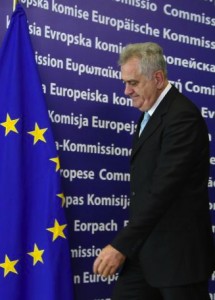Serbian Voters Expect Jobs and Funding From EU Membership
 Serbia’s interest in joining the EU has not been dented by troubles in Europe, a survey has shown. Despite increasing unemployment and higher prices across the continent, a large group of Serbian voters still believe that EU membership will deliver new jobs and provide access to a pool of cash. The poll of more than one thousand people also indicated that Kosovo is no longer seen as such a hurdle for the country in Europe, although Serbian voters are eager to see resolution to issues between Belgrade and Pristina.
Serbia’s interest in joining the EU has not been dented by troubles in Europe, a survey has shown. Despite increasing unemployment and higher prices across the continent, a large group of Serbian voters still believe that EU membership will deliver new jobs and provide access to a pool of cash. The poll of more than one thousand people also indicated that Kosovo is no longer seen as such a hurdle for the country in Europe, although Serbian voters are eager to see resolution to issues between Belgrade and Pristina.
New jobs (32%) and access to European funds (27%) ranked highest among the benefits of EU membership for those who said that they expected life in Serbia to improve as a EU candidate country. Significantly, the number of people who fear an increase in administration, taxes and even higher prices has fallen to just 17%, according to the survey for the European Integration Office of the Government of the Republic of Serbia.
Nearly Fifty Per Cent in Favour of Serbia Joining EU
In this latest litmus test of European feeling in Serbia, 49% of people said that they would vote in favour of full EU membership. Only 25% said they would vote against it, while 19% said they would not vote in a referendum. The remainder did not know how they would respond. The Eurobarometer survey of 1,034 people aged over 18 years took place in June 2012, asked.
In its report ‘European orientation of Serbia’s citizens – Trends’, SEIO has indicated that support for Serbia joining the EU has remained roughly stable in the past six month, with only a marginal increase in uncertainty among some voters. The number of people who would vote in favour of membership is just two per cent lower than the previous survey, while those who say they would vote against membership has also dropped by three per cent. This comes despite issues within the EU and the negative spin put on membership during the country’s recent elections.
Of those who would vote in a referendum, 41% said that they believe that membership of the EU would be good for Serbia, while only 28% think it would be bad for the country. A staggering 31% seem to be indifferent to the issue, believing that it would be neither good nor bad for Serbia. The reasons expressed by those who voted against Serbia’s membership of the EU, the largest percentage (19%) did so because they believed that it would not be good for the country. Fourteen per cent voted against membership because of conditions being imposed on Serbia, while 15% of people who would vote against EU membership said that they did not have any particular reason for doing so.
Kosovo No Longer an Key Obstacle
Encouragingly, the number of people who believe that Kosovo is the main obstacle to Serbia’s candidate status has also dropped to 41%, while 61% of people said that problems between Belgrade and Pristina need resolution, regardless of whether Serbia seeks full membership of the EU.

The need for social and structural change is still felt by an overwhelming 68% of people believe that reforms should be implemented, regardless of the EU issue.
The majority of Serbian voters see that these changes are necessary to create a better Serbia for the people living there. However, this support for reforms shows a decrease from 85% in the previous survey, perhaps indicating that the pinch felt by the current economic crisis it being felt and unconditional support for further reforms that hit the pocket of Serbian voters should not be taken for granted.
More than a third of Serbians say that they are willing to make the extra effort that is required to prepare for EU membership, indicating that the perceived advantages of being part of the EU are getting through, despite the pain of higher prices and increasing unemployment already being felt in the country.
Indeed, more jobs, greater investment and better opportunities for young people are among the most important benefits of membership to Serbian voters. Of those who voted positively in this survey, 39% see the EU as a yellow brick road towards a better future for young people, while 35% believe membership will provide more job opportunities, and 32% see the ability to move freely within the EU as a primary advantage of membership.
Europe is Serbia’s Biggest Donor
Europe’s reputation in Serbia is also benefiting from increased awareness of the EU’s support for Serbia, with 57% of those asked recognising that the European Union is Serbia’s largest financial contributor. Since 2000, the EU and its member states have been the major donors and investors in Serbia, followed by the United States, Norway, Switzerland and Japan.
Serbia’s road to Europe is still not clear, however. The main factors that are seen as hindering Serbia’s EU entry still include conditions placed on the country by Europe (37.5%), but nearly 20% of people place blame on the inability of Serbia’s leadership to get it right. It will remain to be seen if former ultranationalist Tomislav Nikolić can improve on that figure. A much-reduced figure of 8% see a negative Serbian attitude and unwillingness to change (8%) as any obstacle.
Understandably, the EU’s problems have clearly impacted on Serbian voters and have led to some cynicism of the whole process. A quarter of people thinking that there might not even be an EU to join by the time Serbia has chance to do so. A further 30% have faith that the EU will be overcome its current problems, but will turn its back on new members. Only 16% of people think that the EU will weather this storm and continue to grow.


8 / 21 / 2012 8:26 pm
Most of the aid from the west comes in the form of loans which further in-debt Serbia. They come with strings attached and are usually for “projects” the EU wants, which do not benefit Serbia nor Serbs. Serbian companies are usually shut out of these projects too. As one EU worker in Serbia posted on B92 comment section describes what’s going on:
I work with the EU in Serbia. 90% of the money “donated” pays for so-called experts (like me) who don’t know a thing about Serbia, from the EU, working for EU consultancy companies to work on various projects. Serbian companies are not allowed to apply for almost any of these projects. The money also has a number of conditions tied to it as well for Serbia to make reforms specifically geared to the way dictated by Brussels. Most of that money does not stay in Serbia. But it’s not just in Serbia, it’s the same in Bosnia, Montenegro and FRY Macedonia.
(Betty Johnston, 5 February 2012 23:05)
http://www.b92.net/eng/news/comments.php?nav_id=78642